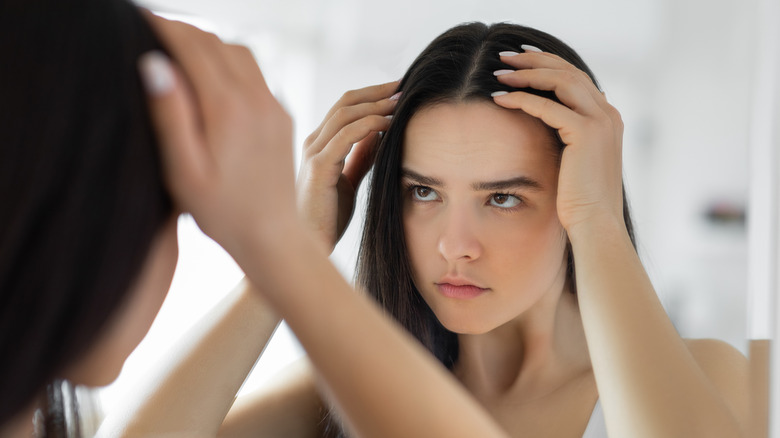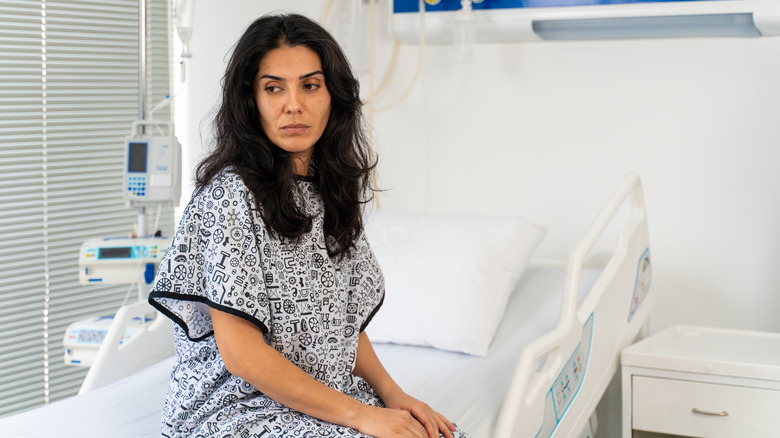Why Hair Loss Is Common After Surgery
Going in for surgery can be nerve-racking. Regardless of who is with you at the hospital bed, after you're wheeled into an operating theater, it's just you and the health professionals who are trying to help you, and all of this can be extremely stressful.
Stress causes hair loss in general, but going through something as challenging as surgery can cause your locks to fall out at an alarming rate. According to plastic surgeon Dr. Larry S. Nichter, in order to understand the reasons you could be losing your hair, you have to first comprehend the different stages of hair growth. On average, a human sheds anywhere between 50-100 hairs a day, per Healthline. As explained by Dr. Nitcher, "Hair bulbs, the living part of hair, have three main phases: growth phase (anagen), involution/regressing phase (catagen), and the resting/quiescent phase (telogen). For the scalp, the growth phase under normal conditions is 2-8 years, involution phase 2-3 weeks, and resting phase around 3 months."
When someone is under stress, something called "telogen effluvium" happens. It's when more of your hair starts entering the telogen state of the hair cycle prematurely, per Nitcher. Also, stress can cause important hair growth nutrients — like biotin, iron, zinc, and protein — to be driven away from your vital organs and this can lead to hair loss too.
Factors that can cause hair loss after surgery
You may have heard that anesthesia could cause hair loss, and that wouldn't be wrong. A 2012 study published in the International Journal of Trichology, found that hypotensive anesthesia could cause postoperative or pressure alopecia (PA), but the length of the surgery was also considered here. The study specifically referred to a 37-year-old woman who developed PA after a five-hour-long surgery.
According to a certified trichologist and founder of Evolution Hair Loss Institute and Advanced Trichology Products, Dr. William Gaunitz, certain medications, such as antibiotics; post-surgery inflammation or trauma to the body; and hormonal changes could also be to blame. Hair loss caused by hormonal shifts can affect women more than men, but it is a real concern post-surgery.
It could also be possible that your hair loss is caused by an allergic reaction to certain medications you are prescribed after surgery, as explained by Healthline. You may want to pay special attention to anti-seizure and anti-thyroid pills and beta blockers.
We discussed the importance of nutrients for healthy hair. Oftentimes when we're stressed, we make bad nutritional choices, too. We either turn to unhealthy foods to make ourselves feel momentarily better or stop paying attention to the quality of our diet altogether. This can also be a reason why hair loss becomes more common after surgery.
Although surgery-induced hair loss is temporary (your hair should grow back after 3-6 months, even without treatment), it can leave those experiencing it in distress. Is complete hair loss preventable after surgery? Maybe not, but there are some things you can do.
What you can do to minimize hair loss after surgery
Start by looking for ways to reduce your stress. Easier said than done, we know, but one way to stop your mind from wandering to worrying thoughts is to sit with your surgeon and go through the ins and outs of the surgery. Talk about the length of the surgery, how recovery might be, and what to commonly expect. This will give you more clarity about the entire process. Also, speak with your doctor about post-surgery medications that could potentially cause hair loss.
You can also try to prioritize getting enough sleep and eating nutritional food. Avoid empty calories and eat food that's good for your health, shared bariatric surgeon, Dr. Guillermo Alvarez. So, eat lots of protein, B vitamins, iron, and zinc, per Medical News Today. Exercise — even some light walking — can also combat hormonal changes that cause hair loss after surgery, per Dr. Nichter.
If you're already at the point where you're seeing chunks of hair strands in your brush, there's no need to panic. There are things like nutritional supplements and melatonin-based topical applications you can turn to, added Dr. Gaunitz. "Melatonin is very powerful actually to decrease telogen effluvium. I've seen it in the clinics for years. So if you use something like a NutraM by Advanced Technology, that will help decrease the impact of the overall telogen effluvium on the hair follicle," explained the hair expert. If the loss of hair is really bothering you, you can meet with your dermatologist to discuss professional treatments like micro-needling, laser therapy, corticosteroid injections, or medications to reverse hair loss, per Healthline.



